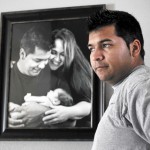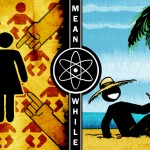Every Monday in Citizenship Confusion, Alan Noble discusses how we confuse our heavenly citizenship with citizenship to the state, culture, and the world.
Things are always terrible on the World Wide Web. It’s just that sometimes those terrible things get rather noisy and hard to ignore. Sometimes they even affect us and our neighbors. Sometimes we actually have to be mindful and discerning about these terrible things, even when they are noisy and truly terrible.
Facebook does a wonderful job of keeping all the terrible things in front of us, constantly: trivial but vociferously articulated religious views, relationship drama, our friend’s Totally Awesome Life, a series of strangely-not-funny cat pictures, your nephew’s Spring Break (mis)adventures. But arguably the noisiest, most offensive, tedious, irrational, significant, and affecting IRL (“in real life”) are political posts. Welcome to the 2012 Election Season. Where disinformation, confirmation bias, deeply held beliefs, genuine concerns for our nation and families, and a desire for meaningful public political discourse get spun together and then spun out endlessly on Twitter and Facebook.
Yes, political discussions have always been ugly, and disinformation has always been a halmark of election years, but the widespread adoption of social networks combined with how easy it is to create and share political statements as images or articles has made it simultaneously easier than ever to check facts and more tedious than ever.
The sheer number of political messages that inundate us daily make it impossible to responsibly and fairly evaluate their claims and draw informed conclusions. And yet, for most of us, we are being affected by these messages, even when we don’t actively engage them.
For example, if you believe that Romney looks a bit stiff and phony, then when you see a friend share a link with the title, “Researcher Claims Romney is a Robot! Breaking!,” there’s a decent chance you will accept the title’s claim as true, or likely true, even if you don’t bother to read the article to see if there are any reliable sources supporting the accusation.
In our defense, we can’t check everything. And when we’ve spent a significant amount of time deciding to support a candidate, party, and the related publications that support it, we expect that we can reasonably trust them to convey the truth. In our more nihilistic moments, I suppose we can be honest with ourselves and admit that perhaps some of the political commentary that we read and share isn’t necessarily true. Or, maybe we tell ourselves that even though the article in question is speculation, it’s still reasonable to believe it, since the other political party/candidate is not beneath such indignities.
If we believe that political structures are very important for Christians to participate in, since they can be a blessing or a curse to our neighbors and ourselves, we cannot allow the seemingly endless number of deceptive political messages and practices deter us from making an honest effort to publicly discuss issues that deeply matter to our nation. With that in mind, I’d like to offer a kind of voter’s guide, but not the usual kind which tells you who to vote for if you are Saved or Conservative or if you care about the Poor or Unions.
What follows is my Citizenship Confusion’s Voter’s Guide to the Internets–not a guide on how to vote, but how to be a voter online–wherein you will find short statements and articles which (I hope) will help you think through how to be a discerning, charitable, politicly engaged Christian online.
The 2012 Citizenship Confusion’s Voter’s Guide to the Internets
One: You have a moral obligation to your neighbor to love them by not promoting and supporting evil, dehumanizing humor, or deception. Which means that even though Facebook has made it absurdly easy to share articles that you maybe haven’t even read yet, or have only given a cursory glance to, you are responsible for what you share.
Those who are in positions of authority–teachers, pastors, authors, public figures, elders–have a greater obligation here, but it affects us all. A good way to love your neighbor is to responsibly check the veracity of links before you share them or at least preface your share with a statement that acknowledges that you have not done so yet. Lies get spread at an absurd rate, even through Christian communities online, because people are unwilling to love their neighbor enough to check their sources.
Two: Check your source, then check the source’s source. It is very, very common for bad sources to cite sources which cite sources which turn out to be mere speculation, or even nonexistent!
For example, see this report from Western Center for Journalism, a group with over 216,000 followers on Facebook. This “report” consists of a YouTube video, which cites a WorldNetDaily article, which cites a few “experts” who, without any substantiating evidence, claim that Obama is gay. Some number of those 216,000 followers saw a headline that stated that a “documented report” claimed that Obama is gay! A small number probably clicked on the article. Even fewer watched the video. Even fewer read the WorldNetDaily article. Even fewer of them Googled the sources cited in that article. But no small number was influenced.
Another example: last month rumors that the Muslim Brotherhood was crucifying dissenters spread quickly, along with attacks on Obama for letting this happen, the failure of Egypt as a democracy, and commentary on the savagery of the Muslims. Except, the reports were unfounded. WorldNetDaily claimed these crucifixions were happening, and they cited a Sky News report–which had mysteriously disappeared–and numerous Arabic sources. If you bother to click on those numerous Arabic sources, you find that they cite the same missing Sky News report. Thankfully, someone at the National Post actually contacted Sky News, who explained that they removed the post within minutes because it was based on unconfirmed third-party reports. That original WND article, which was shared fifteen thousand times on Facebook, helped shape the way many people thought about Muslims, Egypt, the Arab Spring, and Obama’s presidency. And the only way you would know that it was a false report was if you took the time to diligently sort through the facts.
For an example of how images can also easily fool us on Facebook, see, Citizenship Confusion: The Trayvon Martin Gangsta Picture that the Media Doesn’t Want You to See?
Three: Prayerfully make an effort to control your tone and rhetoric as you discuss politics online so that you evidently love your neighbor and reflect Christ’s love.
Over the last year or so, I have written a number of columns on this subject:
Citizenship Confusion: Dismissing our Opponents –“Dismissiveness implies that their perspective is so dumb that it is not worth your time to consider it.”
Citizenship Confusion: Do You Care What Others Think about You? –“Our culture delights in and rewards those who spread controversy, but do we? Should we?”
Citizenship Confusion: Care to See Charity? –“At the risk of sounding dramatic, I want to suggest that charity is a virtue that is tragically and damningly lacking in the church, particularly on the Internet.”
Four: Remain open to correction, because you are going to be wrong, a lot. And that is okay. Sometimes our biases blind us to the truth, other times we willfully buy into and promote a simplistic narrative about an issue because it makes us feel safer. Both errors will lead us to sin. But there are ways we can combat these tendencies.
Citizenship Confusion: You have no Idea how Biased You are, but I Do. You’re Welcome. –“We all have biases, and our efforts to rid ourselves of them through education and self-awareness don’t actually ‘fix’ the problem. Even worse, our bias-blindness has serious consequences.”
Citizenship Confusion: 9/11 and the Complexity of the World —“By accepting that the world is complex we acknowledge our own finitude before it, our inability to completely understand issues, and the possibility that we are wrong.”
Five: Always remember: your words matter, and what you share is your words. They affect people. They reflect on your faith, the Church, and Christ. They can have very real and very serious consequences in the world. Please careful consider what you support and what you promote.
Let’s all work towards making the World Wide Web a little less terrible.
For more on thinking critically about the news, see Not Fit for Dinner: Consuming News Carefully and Critically and Not Fit for Dinner: Staying Informed—and Sane—During Election Season.












